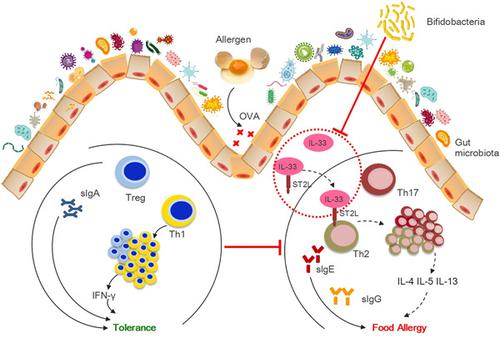当前位置:
X-MOL 学术
›
J. Cell. Physiol.
›
论文详情
Our official English website, www.x-mol.net, welcomes your
feedback! (Note: you will need to create a separate account there.)
Bifidobacterium breve M-16V alters the gut microbiota to alleviate OVA-induced food allergy through IL-33/ST2 signal pathway.
Journal of Cellular Physiology ( IF 4.5 ) Pub Date : 2020-05-11 , DOI: 10.1002/jcp.29751 Na Li 1, 2 , Yi Yu 1 , Xuehua Chen 1 , Shenshen Gao 1 , Qingqing Zhang 1 , Chundi Xu 1
Journal of Cellular Physiology ( IF 4.5 ) Pub Date : 2020-05-11 , DOI: 10.1002/jcp.29751 Na Li 1, 2 , Yi Yu 1 , Xuehua Chen 1 , Shenshen Gao 1 , Qingqing Zhang 1 , Chundi Xu 1
Affiliation

|
There has been a marked increase in life‐threatening food allergy (FA). One hypothesis is that changes in bacterial communities may be key to FA. To better understand how gut microbiota regulates FA in humans, we established a mouse model with FA induced by ovalbumin. We found that the mice with FA had abnormal bacterial composition, accompanied by increased immunoglobulin G, immunoglobulin E, and interleukin‐4/interferon‐γ, and there existed a certain coherence between them. Interestingly, Bifidobacterium breve M‐16V may alter the gut microbiota to alleviate the allergy symptoms by IL‐33/ST2 signaling. Our results indicate that gut microbiota is essential for regulating FA to dietary antigens and demonstrate that intervention in bacterial community regulation may be therapeutically related to FA.
中文翻译:

短双歧杆菌M-16V通过IL-33 / ST2信号途径改变肠道菌群,减轻OVA诱导的食物过敏。
威胁生命的食物过敏(FA)显着增加。一种假设是细菌群落的变化可能是FA的关键。为了更好地了解肠道菌群如何调节人的FA,我们建立了由卵白蛋白诱导的FA的小鼠模型。我们发现FA小鼠的细菌组成异常,伴有免疫球蛋白G,免疫球蛋白E和白细胞介素-4 /干扰素-γ升高,并且它们之间存在一定的连贯性。有趣的是,短双歧杆菌M-16V可能会改变肠道菌群,从而通过IL-33 / ST2信号传导减轻过敏症状。我们的结果表明,肠道菌群对于调节FA对饮食抗原的作用至关重要,并表明对细菌群落调控的干预可能与FA在治疗上有关。
更新日期:2020-05-11
中文翻译:

短双歧杆菌M-16V通过IL-33 / ST2信号途径改变肠道菌群,减轻OVA诱导的食物过敏。
威胁生命的食物过敏(FA)显着增加。一种假设是细菌群落的变化可能是FA的关键。为了更好地了解肠道菌群如何调节人的FA,我们建立了由卵白蛋白诱导的FA的小鼠模型。我们发现FA小鼠的细菌组成异常,伴有免疫球蛋白G,免疫球蛋白E和白细胞介素-4 /干扰素-γ升高,并且它们之间存在一定的连贯性。有趣的是,短双歧杆菌M-16V可能会改变肠道菌群,从而通过IL-33 / ST2信号传导减轻过敏症状。我们的结果表明,肠道菌群对于调节FA对饮食抗原的作用至关重要,并表明对细菌群落调控的干预可能与FA在治疗上有关。









































 京公网安备 11010802027423号
京公网安备 11010802027423号